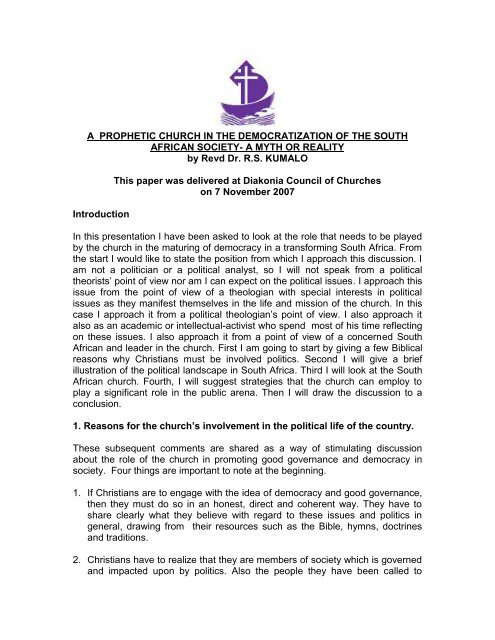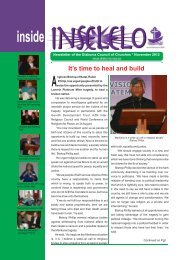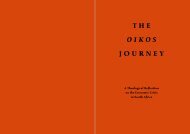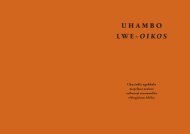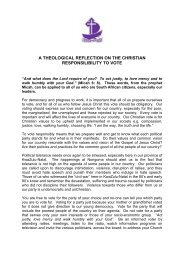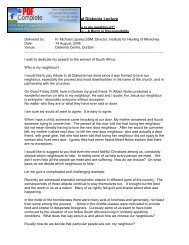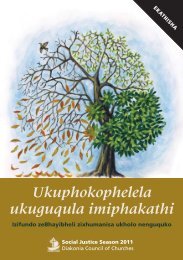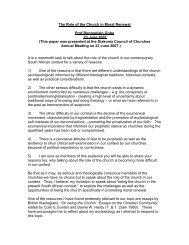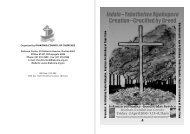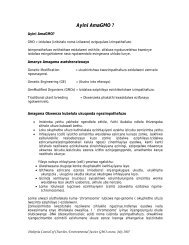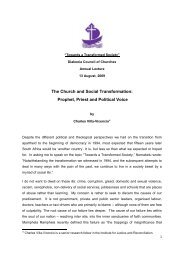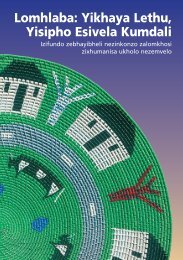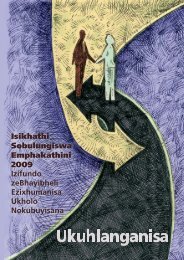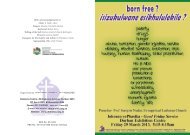a prophetic church in the democratization of the south african society
a prophetic church in the democratization of the south african society
a prophetic church in the democratization of the south african society
Create successful ePaper yourself
Turn your PDF publications into a flip-book with our unique Google optimized e-Paper software.
A PROPHETIC CHURCH IN THE DEMOCRATIZATION OF THE SOUTH<br />
AFRICAN SOCIETY- A MYTH OR REALITY<br />
by Revd Dr. R.S. KUMALO<br />
Introduction<br />
This paper was delivered at Diakonia Council <strong>of</strong> Churches<br />
on 7 November 2007<br />
In this presentation I have been asked to look at <strong>the</strong> role that needs to be played<br />
by <strong>the</strong> <strong>church</strong> <strong>in</strong> <strong>the</strong> matur<strong>in</strong>g <strong>of</strong> democracy <strong>in</strong> a transform<strong>in</strong>g South Africa. From<br />
<strong>the</strong> start I would like to state <strong>the</strong> position from which I approach this discussion. I<br />
am not a politician or a political analyst, so I will not speak from a political<br />
<strong>the</strong>orists‟ po<strong>in</strong>t <strong>of</strong> view nor am I can expect on <strong>the</strong> political issues. I approach this<br />
issue from <strong>the</strong> po<strong>in</strong>t <strong>of</strong> view <strong>of</strong> a <strong>the</strong>ologian with special <strong>in</strong>terests <strong>in</strong> political<br />
issues as <strong>the</strong>y manifest <strong>the</strong>mselves <strong>in</strong> <strong>the</strong> life and mission <strong>of</strong> <strong>the</strong> <strong>church</strong>. In this<br />
case I approach it from a political <strong>the</strong>ologian‟s po<strong>in</strong>t <strong>of</strong> view. I also approach it<br />
also as an academic or <strong>in</strong>tellectual-activist who spend most <strong>of</strong> his time reflect<strong>in</strong>g<br />
on <strong>the</strong>se issues. I also approach it from a po<strong>in</strong>t <strong>of</strong> view <strong>of</strong> a concerned South<br />
African and leader <strong>in</strong> <strong>the</strong> <strong>church</strong>. First I am go<strong>in</strong>g to start by giv<strong>in</strong>g a few Biblical<br />
reasons why Christians must be <strong>in</strong>volved politics. Second I will give a brief<br />
illustration <strong>of</strong> <strong>the</strong> political landscape <strong>in</strong> South Africa. Third I will look at <strong>the</strong> South<br />
African <strong>church</strong>. Fourth, I will suggest strategies that <strong>the</strong> <strong>church</strong> can employ to<br />
play a significant role <strong>in</strong> <strong>the</strong> public arena. Then I will draw <strong>the</strong> discussion to a<br />
conclusion.<br />
1. Reasons for <strong>the</strong> <strong>church</strong>’s <strong>in</strong>volvement <strong>in</strong> <strong>the</strong> political life <strong>of</strong> <strong>the</strong> country.<br />
These subsequent comments are shared as a way <strong>of</strong> stimulat<strong>in</strong>g discussion<br />
about <strong>the</strong> role <strong>of</strong> <strong>the</strong> <strong>church</strong> <strong>in</strong> promot<strong>in</strong>g good governance and democracy <strong>in</strong><br />
<strong>society</strong>. Four th<strong>in</strong>gs are important to note at <strong>the</strong> beg<strong>in</strong>n<strong>in</strong>g.<br />
1. If Christians are to engage with <strong>the</strong> idea <strong>of</strong> democracy and good governance,<br />
<strong>the</strong>n <strong>the</strong>y must do so <strong>in</strong> an honest, direct and coherent way. They have to<br />
share clearly what <strong>the</strong>y believe with regard to <strong>the</strong>se issues and politics <strong>in</strong><br />
general, draw<strong>in</strong>g from <strong>the</strong>ir resources such as <strong>the</strong> Bible, hymns, doctr<strong>in</strong>es<br />
and traditions.<br />
2. Christians have to realize that <strong>the</strong>y are members <strong>of</strong> <strong>society</strong> which is governed<br />
and impacted upon by politics. Also <strong>the</strong> people <strong>the</strong>y have been called to
m<strong>in</strong>ister to are impacted upon by politics and issues <strong>of</strong> governance ei<strong>the</strong>r<br />
positively or negatively depend<strong>in</strong>g on who <strong>the</strong>y are and <strong>the</strong>ir social status.<br />
Therefore <strong>the</strong>y cannot ignore politics.<br />
3. It is important to note that <strong>the</strong> idea <strong>of</strong> democracy is not someth<strong>in</strong>g specifically<br />
religious or Christian. It has been found mostly <strong>in</strong> secular <strong>in</strong>stitutions ra<strong>the</strong>r<br />
than religious ones, because <strong>the</strong>se tend to be autocratic and <strong>the</strong>ocratic. But it<br />
is also important to understand that <strong>the</strong> struggle for democracy <strong>in</strong> <strong>society</strong> is a<br />
struggle aga<strong>in</strong>st any form <strong>of</strong> leadership that is undemocratic and viewed to be<br />
authoritarian.<br />
4. It is also important to recognize that Christianity like most religions has a<br />
particular view <strong>of</strong> how <strong>the</strong> world is to be governed. For <strong>in</strong>stance Christianity<br />
builds on <strong>the</strong> view that <strong>the</strong> world has to be governed us<strong>in</strong>g <strong>the</strong> basic<br />
pr<strong>in</strong>ciples‟ <strong>of</strong> governance <strong>in</strong> God‟s household such as equality, justice, peace<br />
and human dignity. I propose that it is imperative for <strong>the</strong> <strong>church</strong> to teach,<br />
practice and enact <strong>the</strong>se pr<strong>in</strong>ciples <strong>in</strong> <strong>the</strong> public arena as part <strong>of</strong> its mission.<br />
In spite <strong>of</strong> <strong>the</strong> above reasons that justify <strong>the</strong> <strong>in</strong>volvement <strong>of</strong> <strong>the</strong> <strong>church</strong> <strong>in</strong> matters<br />
<strong>of</strong> political nature and governance, <strong>the</strong>re has been a sense <strong>of</strong> disagreement and<br />
disappo<strong>in</strong>tment from some quarters <strong>in</strong> our <strong>society</strong> that s<strong>in</strong>ce <strong>the</strong> beg<strong>in</strong>n<strong>in</strong>g <strong>of</strong> <strong>the</strong><br />
new dispensation <strong>the</strong> <strong>church</strong> has not been <strong>in</strong>volved <strong>in</strong> <strong>the</strong> political life <strong>of</strong> <strong>the</strong><br />
country. Constantly we have heard questions such as, where is <strong>the</strong> <strong>prophetic</strong><br />
Church ? Where have all <strong>the</strong> prophets gone to? Most <strong>of</strong> <strong>the</strong> time such questions<br />
come from people ei<strong>the</strong>r who work with poor people who feel that <strong>the</strong> <strong>church</strong> has<br />
neglected <strong>the</strong>m. But it also comes from government <strong>of</strong>ficials when <strong>the</strong>y want <strong>the</strong><br />
<strong>church</strong> to help <strong>the</strong>m deal with problems such as <strong>the</strong> breakdown <strong>of</strong> <strong>the</strong> moral fiber<br />
or to deliver services. For bus<strong>in</strong>ess people when <strong>the</strong>y are frustrated by crime and<br />
corruption <strong>the</strong>y also ask <strong>the</strong> same questions. The above groups ask <strong>the</strong> question<br />
<strong>of</strong> <strong>the</strong> whereabouts <strong>of</strong> <strong>the</strong> <strong>church</strong> not because <strong>the</strong>y are look<strong>in</strong>g for a <strong>prophetic</strong><br />
<strong>church</strong>, but one that can cooperate with <strong>the</strong>m and most <strong>of</strong> <strong>the</strong> time <strong>in</strong> <strong>the</strong>ir own<br />
terms, not those <strong>of</strong> <strong>the</strong> <strong>church</strong>. The poor ask this question because <strong>the</strong>y are<br />
look<strong>in</strong>g for a different <strong>church</strong>, one that will walk with <strong>the</strong>m as <strong>the</strong>y are faced by<br />
<strong>the</strong> dehumanization that <strong>the</strong>y still experience even <strong>in</strong> <strong>the</strong> new dispensation<br />
through lack <strong>of</strong> basic human necessities such as water, hous<strong>in</strong>g, jobs and <strong>the</strong><br />
erosion <strong>of</strong> <strong>the</strong>ir dignity. As a result for most <strong>of</strong> <strong>the</strong>m to talk <strong>of</strong> a <strong>prophetic</strong> <strong>church</strong><br />
<strong>in</strong> South Africa is to talk <strong>of</strong> a dream not reality. But <strong>the</strong> question to ask is “Is a<br />
<strong>prophetic</strong> <strong>church</strong> <strong>in</strong> South Africa a myth or reality? Are <strong>the</strong> assumptions that <strong>the</strong><br />
<strong>church</strong> is not <strong>prophetic</strong> anymore true or misplaced? In o<strong>the</strong>r words is a <strong>prophetic</strong><br />
<strong>church</strong> <strong>in</strong> SA just a pipe-dream or a dream that is gradually becom<strong>in</strong>g a reality?<br />
Those are <strong>the</strong> questions I hope to address <strong>in</strong> this presentation. I th<strong>in</strong>k <strong>in</strong> a<br />
discussion <strong>of</strong> this nature it is imperative that we start with def<strong>in</strong><strong>in</strong>g what we mean<br />
by a <strong>prophetic</strong> <strong>church</strong>. By a <strong>prophetic</strong> <strong>church</strong> we mean “a <strong>church</strong> that engages<br />
itself <strong>in</strong> socio, economic and political life <strong>of</strong> a <strong>society</strong>, guided by its understand<strong>in</strong>g<br />
<strong>of</strong> <strong>the</strong> K<strong>in</strong>gdom <strong>of</strong> God, hold<strong>in</strong>g <strong>the</strong> transformation <strong>of</strong> <strong>the</strong> world to emulate values
<strong>of</strong> <strong>the</strong> k<strong>in</strong>gdom as its vision and mission to <strong>the</strong> world. By <strong>the</strong> <strong>church</strong> here I refer<br />
to both <strong>the</strong> <strong>church</strong> as a community <strong>of</strong> believers, <strong>the</strong> people <strong>of</strong> God at worship,<br />
fellowship and service <strong>in</strong> <strong>the</strong>ir local communities. Secondly I also mean <strong>the</strong><br />
<strong>in</strong>stitutional <strong>church</strong>, <strong>the</strong> <strong>church</strong> as a hierarchy, <strong>the</strong> representatives <strong>of</strong> <strong>the</strong> people<br />
<strong>of</strong> God such pastors and bishops toge<strong>the</strong>r with <strong>the</strong> structures <strong>of</strong> <strong>the</strong> <strong>church</strong>. So I<br />
will use <strong>the</strong> term” <strong>church</strong>” <strong>in</strong>terchangeably referr<strong>in</strong>g to <strong>the</strong>se two groups.<br />
2. Explor<strong>in</strong>g <strong>the</strong> political landscape <strong>of</strong> <strong>the</strong> South African <strong>society</strong><br />
Impacted <strong>of</strong> democracy to people <strong>in</strong> <strong>society</strong>.<br />
Social level<br />
It is a fact that <strong>the</strong> current dispensation brought a lot <strong>of</strong> benefits for people <strong>in</strong><br />
South Africa. As a we are always rem<strong>in</strong>ded, democracy brought freedom with it.<br />
Just <strong>the</strong> feel<strong>in</strong>g <strong>of</strong> be<strong>in</strong>g an important and respected citizens <strong>of</strong> a country without<br />
be<strong>in</strong>g restricted by laws on where to stay, buy, what to ride, swim, work is an<br />
achievement. The freedom to associate with any person or organization is an<br />
added value.<br />
Economic level<br />
The economy <strong>of</strong> this country is grow<strong>in</strong>g at a rate <strong>of</strong> about 6% annually which is<br />
quite an achievement. More people have houses, access to water and electricity,<br />
education and health care. It is also true that despite <strong>the</strong>se success stories South<br />
Africa is experienc<strong>in</strong>g a flurry <strong>of</strong> challenges that leave <strong>the</strong> majority <strong>of</strong> citizens<br />
without enjoy<strong>in</strong>g <strong>the</strong> benefits <strong>of</strong> freedom and democracy. More people are faced<br />
with problems such as abject poverty, unemployment, hous<strong>in</strong>g, land and lack <strong>of</strong><br />
service delivery etc. As a result we have seen a number <strong>of</strong> riots and resistance<br />
activities by dissatisfied communities Khutsong, Harrismith, Vryburg etc. This<br />
demonstrates that <strong>the</strong> growth <strong>of</strong> <strong>the</strong> economy does not translate to a better life<br />
for all people <strong>in</strong> <strong>the</strong> country. It is this group that feels alienated by <strong>the</strong> <strong>church</strong>.<br />
Political level<br />
At a political level <strong>the</strong> loom<strong>in</strong>g elections <strong>of</strong> <strong>the</strong> leader <strong>of</strong> <strong>the</strong> rul<strong>in</strong>g party <strong>in</strong><br />
Limpompo has led to a focus to <strong>the</strong> so called “succession debate.” The media<br />
has played a big role <strong>in</strong> creat<strong>in</strong>g a discussion around this issue and this has<br />
raised a number <strong>of</strong> po<strong>in</strong>ts <strong>of</strong> views, some positive and o<strong>the</strong>rs negative on how<br />
this issue is go<strong>in</strong>g to impact on <strong>the</strong> country. The <strong>church</strong> has been conspicuously<br />
silence when it comes to this issue. What need to be explored are <strong>the</strong> reasons<br />
for <strong>the</strong> silence and also strategies to address it and that is what I am turn<strong>in</strong>g to<br />
now.<br />
3. Strategies <strong>of</strong> build<strong>in</strong>g good governance through <strong>the</strong> Religion<br />
and Governance Programme.<br />
I will now identify strategies to address <strong>the</strong> lack <strong>of</strong> participation <strong>of</strong> <strong>the</strong> <strong>church</strong> <strong>in</strong><br />
public processes <strong>of</strong> governance. The question is, “what practical strategies can
<strong>the</strong> <strong>church</strong> apply to participate <strong>in</strong> <strong>the</strong> nurtur<strong>in</strong>g <strong>of</strong> good governance <strong>in</strong> South<br />
Africa?” How can <strong>the</strong> dream <strong>of</strong> a <strong>prophetic</strong> <strong>church</strong> become a reality?<br />
3.1 Discover<strong>in</strong>g a <strong>the</strong>ology <strong>of</strong> democracy<br />
Dur<strong>in</strong>g <strong>the</strong> struggle aga<strong>in</strong>st apar<strong>the</strong>id <strong>the</strong>re was an abundance <strong>of</strong> liberation<br />
<strong>the</strong>ologians that helped <strong>the</strong> <strong>church</strong> with <strong>the</strong>ological frameworks when do<strong>in</strong>g <strong>the</strong>ir<br />
socio-economic and political-analysis work. Dur<strong>in</strong>g <strong>the</strong> early years <strong>of</strong> transition<br />
<strong>the</strong> government had a negative attitude towards <strong>the</strong>ology see<strong>in</strong>g it as <strong>of</strong> no value<br />
<strong>in</strong> comparison to science and o<strong>the</strong>r discipl<strong>in</strong>es (SABC, 16 June 2000) necessary<br />
to <strong>the</strong> build<strong>in</strong>g <strong>of</strong> a new <strong>society</strong>. This led to a closure <strong>of</strong> <strong>the</strong>ological faculties and<br />
a mass departure <strong>of</strong> <strong>the</strong>ologians to o<strong>the</strong>r fields such as government and private<br />
sector. As result <strong>the</strong>re has been a vacuum <strong>in</strong> <strong>the</strong> <strong>the</strong>ological discourse.<br />
Archbishop Tutu has argued for a <strong>the</strong>ology that will propagate <strong>the</strong> <strong>church</strong>‟s<br />
<strong>in</strong>volvement <strong>in</strong> politics;<br />
If we say that religion cannot be concerned with politics, <strong>the</strong>n we are really<br />
say<strong>in</strong>g that <strong>the</strong>re is a substantial part <strong>of</strong> human life <strong>in</strong> which God‟s writ does not<br />
run. Religion is not a form <strong>of</strong> escapism. Our God does not permit us to dwell <strong>in</strong> a<br />
k<strong>in</strong>d <strong>of</strong> spiritual ghetto, <strong>in</strong>sulated from <strong>the</strong> real life out <strong>the</strong>re. Out God is not a God<br />
who sanctifies <strong>the</strong> status quo. He is a God <strong>of</strong> surprises, uproot<strong>in</strong>g <strong>the</strong> powerful<br />
and unjust to establish His K<strong>in</strong>gdom (<strong>in</strong> Sparks, 2006:295).<br />
These are s<strong>in</strong>ews <strong>of</strong> a <strong>the</strong>ology <strong>of</strong> democracy that must be developed by <strong>the</strong><br />
<strong>church</strong>, to guide its <strong>in</strong>volvement and upon which effective strategies <strong>of</strong><br />
engagement with <strong>the</strong> state must be built. The good news is that this <strong>the</strong>ology is<br />
already <strong>the</strong>re, some people especially <strong>the</strong> poor are practic<strong>in</strong>g it though <strong>in</strong> <strong>the</strong><br />
fr<strong>in</strong>ges <strong>of</strong> <strong>society</strong>, thus <strong>the</strong> <strong>church</strong> misses it. On <strong>the</strong> 23 rd October 2007 I attended<br />
a workshop organized by ESSET. What was unique was that by far <strong>the</strong> majority<br />
<strong>of</strong> participants close to 94% were people represent<strong>in</strong>g <strong>the</strong> poor e.g. homeless,<br />
PLWA, LPM and Anti-privatization Campaign. There were not more than five<br />
<strong>church</strong> leaders at that meet<strong>in</strong>g. There was a po<strong>in</strong>t where a young women activist<br />
from Soweto who is a devout Christian spoke about <strong>the</strong> <strong>the</strong>ology <strong>of</strong> water, water<br />
as life, a gif from God for all, people as need<strong>in</strong>g to dr<strong>in</strong>k from <strong>the</strong> same well <strong>of</strong><br />
Jacob, no matter who <strong>the</strong>y are and where <strong>the</strong>y stay. The <strong>the</strong>ological s<strong>in</strong>ews and<br />
<strong>in</strong>sights she raised can make some <strong>of</strong> us pr<strong>of</strong>essional <strong>the</strong>ologians feel like<br />
Sunday school children. The po<strong>in</strong>t I am mak<strong>in</strong>g is that <strong>the</strong>re is a <strong>the</strong>ology <strong>of</strong><br />
democracy out <strong>the</strong>re; as Graham Philpott put it “<strong>the</strong> <strong>church</strong> has to listen from <strong>the</strong><br />
poor as <strong>the</strong>y articulate <strong>the</strong> <strong>the</strong>ology that emanates from <strong>the</strong>ir experiences.” 1 For<br />
me <strong>the</strong> <strong>prophetic</strong> <strong>church</strong> is already busy work<strong>in</strong>g <strong>in</strong> communities through such<br />
people and FBOs it is only that <strong>the</strong> <strong>in</strong>stitutional <strong>church</strong> has not realized it, thus it<br />
sleeps on. Hav<strong>in</strong>g formulated a <strong>the</strong>ology <strong>of</strong> democracy <strong>the</strong> <strong>church</strong> will <strong>the</strong>n<br />
embark on appropriate strategies <strong>of</strong> engag<strong>in</strong>g government us<strong>in</strong>g exist<strong>in</strong>g spaces<br />
and <strong>in</strong>vent some where necessary.<br />
3.2. Explor<strong>in</strong>g <strong>the</strong> notion <strong>of</strong> critical solidarity<br />
1 Graham Philpott was evaluat<strong>in</strong>g <strong>the</strong> conference, 23 October 2007, ESSET Meet<strong>in</strong>g Johannesburg.
There was a shift <strong>in</strong> <strong>the</strong> way <strong>the</strong> <strong>church</strong> related from <strong>the</strong> apar<strong>the</strong>id government to<br />
<strong>the</strong> democratic one. The key term that def<strong>in</strong>es <strong>church</strong>-state relations <strong>in</strong><br />
contemporary South Africa is critical solidarity, which means that <strong>the</strong> <strong>church</strong><br />
supports <strong>in</strong>itiatives which promotes justice, peace, democracy, protect<strong>in</strong>g <strong>the</strong><br />
<strong>in</strong>terest <strong>of</strong> those vulnerable and m<strong>in</strong>ority groups while cont<strong>in</strong>u<strong>in</strong>g to protest<br />
aga<strong>in</strong>st unjust policies that <strong>the</strong> democratic government put <strong>in</strong> place. This means<br />
that a new approach to <strong>church</strong>-state relations needs to be developed which<br />
moves away from <strong>the</strong> dom<strong>in</strong>ant models <strong>in</strong> which <strong>the</strong> <strong>church</strong> is ei<strong>the</strong>r absorbed by<br />
<strong>the</strong> state or it regards <strong>the</strong> state as an enemy. But one where <strong>the</strong> <strong>church</strong><br />
ma<strong>in</strong>ta<strong>in</strong>s an <strong>in</strong>dependent and critical stance from which it can engage<br />
government ei<strong>the</strong>r with affirmations or criticism depend<strong>in</strong>g on <strong>the</strong> circumstances.<br />
This proposes a new approach from <strong>the</strong> old ones where <strong>the</strong> <strong>church</strong> was ei<strong>the</strong>r a<br />
puppet <strong>of</strong> <strong>the</strong> state or an enemy. T<strong>in</strong>yiko Maluleke puts it this way:<br />
We must move away from <strong>the</strong> two extreme models <strong>of</strong> <strong>church</strong>-state <strong>in</strong>teraction:<br />
lapdog or cat and mouse (Ecumenical Consultation Report, 23-26 March 2003).<br />
Echo<strong>in</strong>g <strong>the</strong> sentiments for a new way for <strong>church</strong> and state relations <strong>in</strong> South<br />
Africa, <strong>the</strong> Rev. Roxanne Jordan a proponent <strong>of</strong> liberation <strong>the</strong>ology who later<br />
became <strong>the</strong> speaker <strong>of</strong> <strong>the</strong> Nelson Mandela Metropolitan Council argued:<br />
The role <strong>of</strong> <strong>the</strong> <strong>church</strong> <strong>in</strong> <strong>the</strong> new South Africa is constructive engagement and critical<br />
solidarity (Interview, 18 July 2001).<br />
The notion <strong>of</strong> „critical solidarity‟ is built on <strong>the</strong> foundations <strong>of</strong> liberation <strong>the</strong>ology<br />
and <strong>the</strong>ologies <strong>of</strong> reconstruction, which cont<strong>in</strong>ues <strong>the</strong> tradition <strong>of</strong> God‟s<br />
preferential option for <strong>the</strong> poor. It also calls for obey<strong>in</strong>g <strong>the</strong> laws <strong>of</strong> <strong>the</strong> country<br />
only if <strong>the</strong>y are not contrary to <strong>the</strong> laws <strong>of</strong> God, (Acts 4:19, 5:29). The <strong>church</strong>es<br />
also base <strong>the</strong>ir participation on <strong>the</strong> text that says, “The earth is <strong>of</strong> <strong>the</strong> Lord and all<br />
that is <strong>in</strong> it”, (Psalm 24:1) thus br<strong>in</strong>g<strong>in</strong>g congruence between ecclesial and<br />
societal issues. This <strong>in</strong>cludes an embrace <strong>of</strong> <strong>the</strong> liberal constitution that declared<br />
<strong>the</strong> country a neutral-religious state. Be<strong>in</strong>g a neutral-religious state means that<br />
“South Africans are protected from both <strong>the</strong>ocracy and a<strong>the</strong>ism, meanwhile<br />
allow<strong>in</strong>g religion to exist without any constitutional impediments” (Villa-Vicencio,<br />
1992:264). A <strong>prophetic</strong> role <strong>in</strong> this situation means that <strong>the</strong> <strong>church</strong> affirms<br />
government when it is address<strong>in</strong>g <strong>the</strong> needs <strong>of</strong> all people especially <strong>the</strong> poor, but<br />
also criticizes and distances itself from it when it is ignor<strong>in</strong>g <strong>the</strong>m. In this case <strong>the</strong><br />
<strong>church</strong> never stands with government but with <strong>the</strong> poor, it is government who<br />
jo<strong>in</strong>s <strong>the</strong> <strong>church</strong> and <strong>the</strong> poor and it benefit from <strong>the</strong> affirmation and praises <strong>of</strong><br />
<strong>the</strong> <strong>church</strong>, but as soon as it leaves <strong>the</strong> poor, it has left <strong>the</strong> <strong>church</strong> and risks <strong>the</strong><br />
ruthless criticism and denunciation <strong>of</strong> <strong>the</strong> <strong>church</strong> <strong>in</strong> <strong>the</strong> name <strong>of</strong> God.<br />
3.3. Offer<strong>in</strong>g Christian-centered civic Christian Education<br />
One <strong>of</strong> <strong>the</strong> pa<strong>in</strong>ful facts about politics is that people get <strong>the</strong> leaders <strong>the</strong>y deserve.<br />
If people are enlightened and know what <strong>the</strong>y are look<strong>in</strong>g for <strong>in</strong> a leader <strong>of</strong> <strong>the</strong>ir<br />
country, <strong>the</strong>y choose a leader who fits <strong>the</strong>ir expectations with traits such as good<br />
governance abilities, high moral conduct, leadership qualities etc. But if people
do not know what type <strong>of</strong> leader <strong>the</strong>ir <strong>society</strong> needs <strong>the</strong>y elect us<strong>in</strong>g all <strong>the</strong> wrong<br />
criterias such as ethnicity, charisma, popularity etc. In SA we are faced with that<br />
time <strong>of</strong> mak<strong>in</strong>g choices and people are not yet prepared for that. They know voter<br />
education but <strong>the</strong>y have no clue <strong>of</strong> civic education which <strong>in</strong>cludes know<strong>in</strong>g <strong>the</strong><br />
system <strong>of</strong> governance, how it functions, and what type <strong>of</strong> leaders are appropriate<br />
to it. People can hardly tell you what type <strong>of</strong> leader is needed by this country,<br />
<strong>the</strong>y would ra<strong>the</strong>r tell you about which party must <strong>the</strong> person come from. I th<strong>in</strong>k it<br />
is time that <strong>the</strong> <strong>church</strong> embarked on an <strong>in</strong>tentional Civic-based Christian<br />
Education which will teach people about <strong>the</strong>ir rights as citizens and how<br />
important <strong>the</strong>se are for democracy. This will <strong>in</strong>clude teach<strong>in</strong>g people about <strong>the</strong><br />
three levels <strong>of</strong> government, <strong>the</strong> processes <strong>of</strong> elect<strong>in</strong>g <strong>of</strong>ficials start<strong>in</strong>g from <strong>the</strong><br />
local municipality level right up to Parliament. Those who are runn<strong>in</strong>g for high<br />
<strong>of</strong>fice must be challenged to produce <strong>the</strong>ir manifestos, so that <strong>the</strong>se may be<br />
taught to <strong>the</strong> people, who ultimately will make <strong>the</strong> choice <strong>of</strong> <strong>the</strong> leader, based on<br />
what <strong>the</strong>y stand for and promises to do <strong>in</strong>stead <strong>of</strong> <strong>the</strong>ir political slogans and<br />
rhetoric that is only heard through <strong>the</strong> media and rallies. I do th<strong>in</strong>k that <strong>the</strong> <strong>church</strong><br />
can play an important role to make people to decide responsibly who to vote for<br />
and why through education. I contend that it is <strong>the</strong> mission <strong>of</strong> <strong>the</strong> <strong>church</strong> to<br />
provide knowledge, so that know<strong>in</strong>g people may live well (Hosea 4:6).<br />
3.3. Clean<strong>in</strong>g our own house: Inculcat<strong>in</strong>g democracy <strong>in</strong> <strong>the</strong> <strong>church</strong><br />
Be<strong>in</strong>g a <strong>prophetic</strong> <strong>church</strong> does not necessarily mean be<strong>in</strong>g critical <strong>of</strong> o<strong>the</strong>rs only<br />
but it also means that <strong>the</strong> <strong>church</strong> needs to be critical <strong>of</strong> itself. It has to allow<br />
God‟s spirit and messengers to speak truth not only to secular powers but also to<br />
<strong>the</strong> powers <strong>in</strong> and with<strong>in</strong> <strong>the</strong> <strong>church</strong> itself. If <strong>the</strong> <strong>church</strong> is go<strong>in</strong>g to call for<br />
democracy and good governance <strong>in</strong> <strong>society</strong> with credibility, <strong>the</strong>n it faces <strong>the</strong><br />
challenge <strong>of</strong> implement<strong>in</strong>g democracy with<strong>in</strong> its own structures. For an example,<br />
regard<strong>in</strong>g gender and democracy, our analysis is that many <strong>church</strong>es and faith<br />
communities lag beh<strong>in</strong>d <strong>society</strong> <strong>in</strong> general <strong>in</strong> address<strong>in</strong>g patriarchal traditions<br />
and <strong>the</strong> transformation <strong>of</strong> <strong>the</strong>ir own undemocratic structures, policies, and<br />
practices. Women and youth are under-represented <strong>in</strong> positions <strong>of</strong> leadership <strong>in</strong><br />
<strong>the</strong> <strong>church</strong>‟s governance structures. For <strong>the</strong> <strong>church</strong>es to act <strong>prophetic</strong>ally (and<br />
add value <strong>in</strong> a democracy) <strong>the</strong>y need to take democracy with<strong>in</strong> <strong>the</strong> <strong>church</strong>es<br />
<strong>the</strong>mselves seriously. It is hypocritical to expect to challenge a president who<br />
wants to change a constitution to run for more terms <strong>in</strong> <strong>of</strong>fice, whilst bishops <strong>in</strong><br />
<strong>the</strong> <strong>church</strong> are resist<strong>in</strong>g <strong>the</strong> change <strong>of</strong> <strong>the</strong> term <strong>of</strong> <strong>of</strong>fice from life to a number <strong>of</strong><br />
years as permitted by periodical elections and evaluation. Be<strong>in</strong>g a <strong>prophetic</strong><br />
<strong>church</strong> would mean that <strong>the</strong> <strong>church</strong> listens to those <strong>prophetic</strong> voices with<strong>in</strong> <strong>the</strong><br />
<strong>church</strong> itself, challenge its own ethos and rules.<br />
3.4. Us<strong>in</strong>g <strong>the</strong> <strong>in</strong>vited spaces effectively to <strong>in</strong>fluence a parliamentary<br />
democracy<br />
One <strong>of</strong> <strong>the</strong> key criticisms leveled aga<strong>in</strong>st <strong>the</strong> South African government has been<br />
<strong>the</strong> centralization <strong>of</strong> power around <strong>the</strong> presidency. There is a feel<strong>in</strong>g that<br />
government is tightly controlled by <strong>the</strong> president‟s <strong>of</strong>fice so that it is difficult for<br />
o<strong>the</strong>r groups, whe<strong>the</strong>r civil <strong>society</strong>, opposition parties and faith communities (<strong>the</strong>
<strong>church</strong> <strong>in</strong>cluded), to engage it or participate <strong>in</strong> it. The first person to raise <strong>the</strong>se<br />
concerns was Archbishop Tutu when he delivered <strong>the</strong> Nelson Mandela lecture <strong>in</strong><br />
2005 at University <strong>of</strong> <strong>the</strong> Witwatersrand <strong>in</strong> Johannesburg. The second<br />
observations about <strong>the</strong> lack <strong>of</strong> a robust democracy as a result <strong>of</strong> too much<br />
centralization <strong>of</strong> power came from one <strong>of</strong> <strong>the</strong> key members <strong>of</strong> <strong>the</strong> Tripartite<br />
Alliance (which <strong>in</strong>cludes <strong>the</strong> rul<strong>in</strong>g party), <strong>the</strong> South African Communist Party<br />
(SACP) who argued:<br />
It (<strong>the</strong> presidential centre) has sought to build a strong centre with<strong>in</strong> <strong>the</strong> state, <strong>in</strong><br />
which <strong>the</strong> lead<strong>in</strong>g cadre is made up <strong>of</strong> a new political elite (state managers and<br />
technocratic ally-<strong>in</strong>cl<strong>in</strong>ed m<strong>in</strong>isters) and (<strong>of</strong>ten overlapp<strong>in</strong>g with <strong>the</strong>m) a new<br />
generation <strong>of</strong> black private sector BEE managers/capitalists (Bua Komanisi,<br />
1May 2006). 2<br />
The centralization <strong>of</strong> power and tight control <strong>of</strong> democratic processes was aga<strong>in</strong>st one <strong>of</strong> <strong>the</strong> key<br />
pr<strong>in</strong>ciples <strong>of</strong> <strong>the</strong> Freedom Charter (manifesto <strong>of</strong> <strong>the</strong> ANC) that said “The People Shall Govern”<br />
(Polley, 1988:25). The question that needs to be asked today is, are <strong>the</strong> people really govern<strong>in</strong>g?<br />
Political <strong>the</strong>orist Xolelwa Mangcu argues that “<strong>the</strong> people are not govern<strong>in</strong>g but <strong>in</strong>stead <strong>the</strong>y just<br />
follow <strong>the</strong> elected leaders.” He argues, “Many <strong>of</strong> <strong>the</strong> former activists <strong>in</strong> South Africa have found<br />
that <strong>the</strong>y have to go along” (Calland & Graham, 2005:72). When listen<strong>in</strong>g to <strong>the</strong> majority <strong>of</strong> South<br />
Africans <strong>the</strong>y hoped for a decentralized government built on <strong>the</strong> basic foundations <strong>of</strong> direct<br />
democracy. However, that is not what <strong>the</strong>y are experienc<strong>in</strong>g. The same observations are<br />
made by Richard van der Ross <strong>in</strong> his book African Renaissance and Democracy.<br />
Where he asserts that:<br />
Even today, most South Africans, <strong>of</strong> whatever color, do not consider that <strong>the</strong>y<br />
can do much, if anyth<strong>in</strong>g, about <strong>in</strong>fluenc<strong>in</strong>g <strong>the</strong> law, let alone change it. They go<br />
to <strong>the</strong> polls once <strong>in</strong> five years, cast <strong>the</strong>ir vote for a party, and leave <strong>the</strong> rest to <strong>the</strong><br />
politicians. If th<strong>in</strong>gs go wrong, this is blamed on government, but <strong>the</strong>y, <strong>the</strong><br />
citizens, feel <strong>the</strong>y can do noth<strong>in</strong>g about it until <strong>the</strong> next election, especially as,<br />
under <strong>the</strong> system <strong>of</strong> Proportional Representation, <strong>the</strong>y have no immediate<br />
contact with or recourse to a Member <strong>of</strong> Parliament to act as local sound<strong>in</strong>gboard<br />
for <strong>the</strong>ir compla<strong>in</strong>ts or op<strong>in</strong>ion (2004:24).<br />
As a result democracy <strong>in</strong> South Africa has been labeled as a „Parliamentary<br />
Democracy‟ where elected representatives run <strong>the</strong> government on behalf <strong>of</strong> <strong>the</strong><br />
masses (Bua Komanisi, 24 May 2006). Citizens wait for delivery <strong>of</strong> services as<br />
promised and so <strong>the</strong> government is seen as a delivery-mechanism not a system<br />
<strong>of</strong> participation <strong>in</strong> <strong>the</strong> governance <strong>of</strong> <strong>the</strong> country. Civil <strong>society</strong> groups are f<strong>in</strong>d<strong>in</strong>g it<br />
very difficult to <strong>in</strong>fluence government as required by democracy which is <strong>the</strong><br />
government <strong>of</strong> <strong>the</strong> people. In <strong>the</strong> words <strong>of</strong> Peter Vale it is no longer a “liv<strong>in</strong>g<br />
democracy” (Calland & Graham 2005:13). K Fayemi po<strong>in</strong>ts to <strong>the</strong> problem with<br />
this when he notes; “when we <strong>the</strong> people withdraw our trust <strong>in</strong> leaders or<br />
discountenance politicians, we make our democratic <strong>in</strong>stitutions less effective<br />
and risk mak<strong>in</strong>g ourselves ungovernable”. Fayemi goes on to argue that;<br />
2 BEE refers to Black Economic Empowerment, a strategy aimed at balanc<strong>in</strong>g <strong>the</strong> economic <strong>in</strong>equalities by<br />
<strong>of</strong>fer<strong>in</strong>g black people opportunities to own bus<strong>in</strong>esses.
Real leadership ought to <strong>in</strong>volve motivat<strong>in</strong>g people to solve problems with<strong>in</strong> <strong>the</strong>ir<br />
own communities, ra<strong>the</strong>r than re<strong>in</strong>forc<strong>in</strong>g <strong>the</strong> overlords <strong>of</strong> <strong>the</strong> state over its<br />
citizens, and to build and streng<strong>the</strong>n political <strong>in</strong>stitutions that can mediate<br />
between <strong>in</strong>dividual and group <strong>in</strong>terests (2006:56).<br />
The challenge is that even those who were elected by <strong>the</strong> people to be <strong>the</strong>ir<br />
leaders are not always held accountable by <strong>the</strong> people who elected <strong>the</strong>m. This is<br />
because <strong>the</strong> floor cross<strong>in</strong>g law allow MPs to change from one party to ano<strong>the</strong>r,<br />
without <strong>the</strong> permission <strong>of</strong> <strong>the</strong>ir constituencies. This also lead to political apathy<br />
because if people can just change parties without talk<strong>in</strong>g to me as <strong>the</strong> one who<br />
voted <strong>the</strong>m <strong>in</strong> <strong>the</strong> first place why do I need to take vot<strong>in</strong>g seriously. The above<br />
reason may be true for most sectors <strong>of</strong> <strong>society</strong> not to have a way <strong>of</strong> <strong>in</strong>fluenc<strong>in</strong>g<br />
government, but I am not sure if that is <strong>the</strong> case with <strong>the</strong> <strong>church</strong>. As we were told<br />
by Dr Frank Chikane <strong>in</strong> this same hall a month ago, <strong>the</strong> President has stand<strong>in</strong>g<br />
appo<strong>in</strong>tments to meet with religious leaders twice a year and more if <strong>the</strong>y wanted<br />
to, is that not an <strong>in</strong>vited space for <strong>the</strong> <strong>church</strong> to use? Where is <strong>the</strong> loophole?<br />
Secondly if you go to most <strong>of</strong> <strong>the</strong> prov<strong>in</strong>ces especially here <strong>in</strong> KZN <strong>the</strong>re is a<br />
will<strong>in</strong>gness from <strong>the</strong> part <strong>of</strong> government to collaborate with religious groups (<strong>the</strong><br />
<strong>church</strong> <strong>in</strong>cluded), <strong>of</strong> course <strong>the</strong>y want to do this <strong>in</strong> <strong>the</strong>ir own term and for <strong>the</strong>ir<br />
own agendas, but can we not use <strong>the</strong>se as opportunities to use <strong>in</strong> our own terms<br />
too as a <strong>church</strong> so that we become a <strong>prophetic</strong> <strong>church</strong>? I th<strong>in</strong>k <strong>the</strong> <strong>church</strong> can<br />
use <strong>the</strong> will<strong>in</strong>gness and few opportunities given to it by government to turn this<br />
democracy from a parliamentary one to a lived one, where <strong>the</strong> people can<br />
govern.<br />
3.5. Revitaliz<strong>in</strong>g socio-ecclesial analysis.<br />
Churches have relative autonomy from <strong>the</strong> state as well as <strong>the</strong> state towards <strong>the</strong><br />
<strong>church</strong>. To move towards work<strong>in</strong>g toge<strong>the</strong>r, or challeng<strong>in</strong>g one ano<strong>the</strong>r, requires<br />
a rigorous process <strong>of</strong> analysis so that <strong>the</strong> reasons, issues and terms <strong>of</strong><br />
cooperation, or resistance can be seen clearly. This requires <strong>the</strong> <strong>church</strong> to do<br />
socio-ecclesial analysis. Analysis enables <strong>the</strong> <strong>church</strong> to see <strong>the</strong> issues that need<br />
to be contested or affirmed much more clearly from an <strong>in</strong>formed position. This<br />
was confirmed by Itumeleng Mosala when speak<strong>in</strong>g <strong>in</strong> <strong>the</strong> RGP convention <strong>in</strong><br />
2005 he said” no analysis, no voice” (Report <strong>of</strong> Convention, 2005: 12). This<br />
means that <strong>the</strong> ability <strong>of</strong> <strong>the</strong> <strong>church</strong> to engage government lies <strong>in</strong> <strong>the</strong> amount <strong>of</strong><br />
work it is go<strong>in</strong>g to do <strong>in</strong> socio-ecclesial analysis and research. When Frank<br />
Chikane spoke to us he emphasized <strong>the</strong> importance <strong>of</strong> research so that <strong>the</strong><br />
<strong>church</strong> can talk from an <strong>in</strong>formed po<strong>in</strong>t <strong>of</strong> view <strong>in</strong>stead <strong>of</strong> mak<strong>in</strong>g naïve<br />
statement, thus embarrass<strong>in</strong>g itself to its adversaries such as politicians and<br />
bus<strong>in</strong>ess people. For <strong>in</strong>stance with regard to <strong>the</strong> succession debate <strong>the</strong> <strong>church</strong><br />
has been silent, it has not given any leadership direction to <strong>the</strong> masses<br />
especially its own members on what to do th<strong>in</strong>k and say about this issue.<br />
Christians have been left to <strong>the</strong>ir peril and only dependent to <strong>the</strong> views <strong>of</strong> <strong>the</strong><br />
contest<strong>in</strong>g forces such as partners <strong>of</strong> <strong>the</strong> alliances who are divided and o<strong>the</strong>r<br />
political parties who may be enjoy<strong>in</strong>g <strong>the</strong> divisions <strong>in</strong> <strong>the</strong> rul<strong>in</strong>g party. The <strong>church</strong><br />
does need to do clear analysis <strong>of</strong> <strong>the</strong> situation and <strong>the</strong>n guide <strong>the</strong> nation,<br />
because this is not just a political issue party concern<strong>in</strong>g who <strong>the</strong>y are to elect as
<strong>the</strong>ir president. This issue has to deal with vital matters <strong>of</strong> national <strong>in</strong>terest, here<br />
we are talk<strong>in</strong>g about a party that is rul<strong>in</strong>g <strong>the</strong> country and is likely to rule for more<br />
years to come, <strong>in</strong>stability <strong>in</strong> that party threatens <strong>the</strong> stability <strong>of</strong> <strong>the</strong> country. A<br />
<strong>prophetic</strong> <strong>church</strong> needs to come forward and call <strong>the</strong> both <strong>the</strong> party to sanity<br />
aga<strong>in</strong>. It must rem<strong>in</strong>d us that <strong>the</strong> issue round who will be <strong>the</strong> next president is not<br />
just a party political issue or one that has to do with personalities. It has to do<br />
with <strong>the</strong> foundations and future <strong>of</strong> <strong>the</strong> country, someth<strong>in</strong>g we al have approach<br />
with <strong>the</strong> required seriousness, humility and <strong>in</strong>tegrity. How <strong>the</strong> <strong>church</strong> will have <strong>the</strong><br />
courage to do this only if it takes time to study and analyze what is go<strong>in</strong>g on.<br />
Thus social analysis is key to giv<strong>in</strong>g a credible voice to <strong>the</strong> <strong>church</strong>.<br />
3.6. Strategic networks and partnership<br />
The effectiveness <strong>of</strong> <strong>the</strong> <strong>church</strong> <strong>in</strong> fight<strong>in</strong>g apar<strong>the</strong>id was through its partnership<br />
with o<strong>the</strong>r movements such as <strong>the</strong> United Democratic Front (UDF) and <strong>the</strong>, Black<br />
Consciousness Movement (BCM). This <strong>in</strong>dicates that <strong>the</strong> idea <strong>of</strong> partner<strong>in</strong>g and<br />
collaborat<strong>in</strong>g with o<strong>the</strong>r organizations committed to a common course can enable<br />
<strong>the</strong> <strong>church</strong> to make contribute effectively <strong>in</strong> <strong>the</strong> public arena. Currently <strong>in</strong> KZN,<br />
<strong>the</strong> KwaZulu Natal Christian Council has partnered with five Faith-based<br />
organization to form <strong>the</strong> KwaZulu Natal Christian Consortium. This strategic<br />
partnership among members constitut<strong>in</strong>g <strong>the</strong> consortium seek to ensure that <strong>the</strong><br />
quality and quantity <strong>of</strong> civil <strong>society</strong> engagement with public duty bearers is<br />
<strong>in</strong>creased and, <strong>the</strong>reby, contributed to a streng<strong>the</strong>ned social contract between<br />
<strong>the</strong> state and citizens <strong>in</strong> Kwa-Zulu Natal. It also provides a framework for<br />
multifaceted <strong>in</strong>stitutional cooperation as well as channels for mak<strong>in</strong>g l<strong>in</strong>kages<br />
from <strong>the</strong> poorest citizens at community level to decision makers <strong>in</strong> local<br />
communities, prov<strong>in</strong>cial and national <strong>in</strong>stitutions. Among <strong>the</strong> critical questions<br />
<strong>in</strong>clude questions <strong>of</strong> how do <strong>church</strong>es and <strong>church</strong>-based organizations (CBOs),<br />
and non-governmental organizations (NGOs) relate to one ano<strong>the</strong>r so that <strong>the</strong>y<br />
can engage government structures at local, prov<strong>in</strong>cial and national levels? At <strong>the</strong><br />
ESSET meet<strong>in</strong>g <strong>the</strong>re was a passionate call by delegates for <strong>the</strong>ir <strong>church</strong>es to<br />
jo<strong>in</strong> <strong>the</strong>m <strong>in</strong> <strong>the</strong>ir struggles. I must admit that by nature I am an eternal optimist, I<br />
believe <strong>in</strong> <strong>the</strong> redemptiveness <strong>of</strong> unpredictability. I am already see<strong>in</strong>g an active<br />
<strong>prophetic</strong> <strong>church</strong> <strong>in</strong> this country by just look<strong>in</strong>g at <strong>the</strong> recent events. For <strong>in</strong>stance<br />
<strong>the</strong>re was a time when religious leaders <strong>of</strong> Khutsong stood up with <strong>the</strong>ir people,<br />
marched and led <strong>the</strong>m <strong>in</strong> prayers <strong>of</strong> support. Just recently here <strong>in</strong> KZN some <strong>of</strong><br />
our leaders marched with <strong>the</strong> Abahlali basemijondolo and were sprayed with<br />
water with <strong>the</strong>m here <strong>in</strong> Durban. This for me is a sign <strong>of</strong> <strong>the</strong> com<strong>in</strong>g back <strong>of</strong> <strong>the</strong><br />
<strong>prophetic</strong> <strong>church</strong>.<br />
3.7. Ecumenical and multi-faith mobilizations<br />
One <strong>of</strong> <strong>the</strong> strengths <strong>of</strong> <strong>the</strong> <strong>church</strong> under apar<strong>the</strong>id is that it was backed by<br />
strong ecumenical constituencies and agencies thus it could maximize its impact<br />
<strong>in</strong> <strong>society</strong>. The challenge faced by <strong>the</strong> contemporary <strong>church</strong> is <strong>the</strong> loss <strong>of</strong> <strong>the</strong><br />
spirit <strong>of</strong> ecumenism. There are two reasons for this. One is that <strong>church</strong>es are<br />
tra<strong>in</strong><strong>in</strong>g <strong>the</strong>ir leaders denom<strong>in</strong>ationally, thus <strong>church</strong> leaders no longer value <strong>the</strong><br />
ecumenical colleagueship which those who went before experienced dur<strong>in</strong>g <strong>the</strong>ir
tra<strong>in</strong><strong>in</strong>g at places such as Rhodes and FEDSEM. The second reason l<strong>in</strong>ked to<br />
<strong>the</strong> first one is <strong>the</strong> lack <strong>of</strong> fund<strong>in</strong>g for ecumenical work from overseas agencies<br />
that valued <strong>the</strong> contribution <strong>of</strong> a united <strong>church</strong> front <strong>in</strong> South Africa. For <strong>in</strong>stance<br />
one <strong>of</strong> <strong>the</strong> biggest and consistent funders <strong>of</strong> ecumenical work <strong>in</strong> SA has been <strong>the</strong><br />
Norwegian Church Aid (NCA), which is now round<strong>in</strong>g up its work and wants to<br />
focus <strong>in</strong> o<strong>the</strong>r countries <strong>in</strong> <strong>the</strong> region. There is a need to f<strong>in</strong>d a way <strong>of</strong> reviv<strong>in</strong>g<br />
our ecumenical work and our <strong>church</strong>es need to commit to fund<strong>in</strong>g our<br />
ecumenical agencies. I am <strong>in</strong> <strong>the</strong> executive committee <strong>of</strong> one <strong>of</strong> our ecumenical<br />
bodies which is do<strong>in</strong>g important work <strong>in</strong> <strong>the</strong> prov<strong>in</strong>ce. When you look at <strong>the</strong><br />
contribution <strong>of</strong> member <strong>church</strong>es collectively it cannot even run that organization<br />
for one month. The organization depends on fundrais<strong>in</strong>g for survival as fund<strong>in</strong>g<br />
agencies reduce <strong>the</strong>ir commitments to such organizations this threatens <strong>the</strong>ir<br />
future and ultimately <strong>the</strong> future <strong>of</strong> a <strong>prophetic</strong> <strong>church</strong> <strong>in</strong> South Africa, because<br />
<strong>the</strong>n <strong>the</strong> <strong>church</strong> will need to depend on government‟s mercy and contracts which<br />
do not come without some str<strong>in</strong>gs attached. The po<strong>in</strong>t I am mak<strong>in</strong>g is that <strong>the</strong>re is<br />
an urgent need to streng<strong>the</strong>n<strong>in</strong>g <strong>the</strong> ecumenical movement both by mobiliz<strong>in</strong>g<br />
<strong>the</strong> masses to value ecumenism and resources to fund its work. This will enable<br />
<strong>the</strong> <strong>church</strong> to build for itself a position <strong>of</strong> power from which it can engage<br />
government and be an effective <strong>prophetic</strong> voice that is worth listen<strong>in</strong>g to because<br />
if not listened to it can act aga<strong>in</strong>st <strong>the</strong> state with great impact. Power is seductive<br />
and leads to corruption, but powerlessness is also bad. Therefore <strong>the</strong> <strong>church</strong><br />
must mobilize its resources to move from a state <strong>of</strong> powerlessness to that <strong>of</strong><br />
power. Government‟s power depends on money, but <strong>the</strong> <strong>church</strong> has <strong>the</strong> people,<br />
<strong>the</strong> numbers from which it derives effective power, but <strong>the</strong>se need to be<br />
harnessed. A <strong>prophetic</strong> <strong>church</strong> needs <strong>the</strong> masses, to be powerful and be a force<br />
to be reckoned with.<br />
3.8. Religious Forums<br />
Be<strong>in</strong>g <strong>in</strong> a neutral-religious state <strong>the</strong> <strong>church</strong> needs to learn to value <strong>the</strong><br />
relationship and collaboration with o<strong>the</strong>r religions. By constitution <strong>the</strong> government<br />
needs to work more with religious groups than denom<strong>in</strong>ations or sects. In his<br />
state <strong>of</strong> <strong>the</strong> prov<strong>in</strong>ce address early this year (2007) <strong>the</strong> Premier <strong>of</strong> KZN<br />
committed his government to work<strong>in</strong>g to develop Religious Forums and work with<br />
<strong>the</strong>m. It is a fact that is not for government to such forums that is dangerous but<br />
government does need such sectors to work with and make democracy a reality<br />
and if <strong>the</strong>y are not <strong>the</strong>re it does run <strong>the</strong> temptation <strong>of</strong> want<strong>in</strong>g to form <strong>the</strong>se for<br />
reasons <strong>of</strong> political expediency. I th<strong>in</strong>k that <strong>the</strong> launch<strong>in</strong>g <strong>of</strong> <strong>the</strong> KZN Religious<br />
Leaders Forum some weeks ago is a cause for celebration for all freedom lov<strong>in</strong>g<br />
religious South Africans. This structure must be regarded as a prov<strong>in</strong>cial branch<br />
<strong>of</strong> <strong>the</strong> National Religious Forum. It is through this structure that <strong>the</strong> <strong>church</strong> will<br />
collaborate to engage government. In my m<strong>in</strong>d I still have a picture <strong>of</strong> <strong>the</strong> KZNCC<br />
convention <strong>of</strong> 2005 which was hosted <strong>in</strong> PMBurg where members <strong>of</strong> all <strong>the</strong><br />
majors faiths <strong>in</strong> SA participated for three days deliberated on issues <strong>of</strong> common<br />
concern. Although <strong>the</strong>re were Christian leaders who were grumbl<strong>in</strong>g, because<br />
<strong>the</strong>y are not yet used to this collaboration, <strong>the</strong> sun did not fall from <strong>the</strong> sky. This<br />
aga<strong>in</strong> was an attempt <strong>of</strong> a <strong>prophetic</strong> <strong>church</strong> at work at a local prov<strong>in</strong>cial level to
uild bridges which are vital to susta<strong>in</strong> our democracy. This for me is a sign <strong>of</strong> a<br />
<strong>prophetic</strong> <strong>church</strong> at work.<br />
3.9. Conclusion<br />
In this presentation I have looked at <strong>the</strong> follow<strong>in</strong>g po<strong>in</strong>ts:<br />
‣ Explored <strong>the</strong> reasons for <strong>the</strong> <strong>church</strong> to be <strong>in</strong>volved <strong>in</strong> politics<br />
‣ Discussed <strong>the</strong> fears that a <strong>prophetic</strong> <strong>church</strong> is not real <strong>in</strong> South Africa<br />
‣ Gave a glimpse to <strong>the</strong> political situation that calls for serious <strong>in</strong>volvement<br />
<strong>of</strong> <strong>the</strong> <strong>church</strong>.<br />
‣ Suggested strategies for <strong>the</strong> <strong>church</strong> to use to become a <strong>prophetic</strong> <strong>church</strong>.<br />
I conclude this presentation by argu<strong>in</strong>g that a <strong>prophetic</strong> <strong>church</strong> <strong>in</strong> this country is<br />
not a myth but a reality. Yes it is still at is <strong>in</strong>fant stages just like our democracy.<br />
Ultimately we can all start believ<strong>in</strong>g that a <strong>prophetic</strong> <strong>church</strong> is possible <strong>in</strong> South<br />
Africa.<br />
I thank you.<br />
BIBLIOGRAPHY
Allen, J. 2006. Rabble-Rouser for Peace: The Authorized Biography <strong>of</strong> Desmond<br />
Tutu. London: Rider Books.<br />
Asmal, K. (ed) 2003. Nelson Mandela: From Freedom to <strong>the</strong> Future.<br />
Johannesburg: Jonathan Ball Publishers.<br />
Balcomb, T. Left, Right and Centre: Evangelicals and <strong>the</strong> Struggle for Liberation<br />
<strong>in</strong> South Africa, Journal <strong>of</strong> Theology for Sou<strong>the</strong>rn Africa, March 2004,<br />
Number118<br />
Bon<strong>in</strong>o, M. 1983 Towards a Christian Political Ethics. London: SCM Press.<br />
Boon, M. 1996. The African Way: The power <strong>of</strong> <strong>in</strong>teractive leadership.<br />
Johannesburg: Zebra.<br />
Bua Komanisi Information Bullet<strong>in</strong> <strong>of</strong> <strong>the</strong> Central Committee <strong>of</strong> <strong>the</strong> South African<br />
Communist Part Vol 5, Issue no 1, May 2006, 24.<br />
Chapman, A. & Spong, B. 2003. Religion & Reconciliation <strong>in</strong> South Africa.<br />
Philadelphia: Templeton Foundation Press.<br />
Calland, R. & Graham, P. 2005. Democracy <strong>in</strong> <strong>the</strong> Time <strong>of</strong> Mbeki. Cape Town:<br />
IDASA.<br />
Challenge Magaz<strong>in</strong>e, 13 October 1998<br />
Challenge Magaz<strong>in</strong>e, 22 June 1994<br />
Cloete, J.J.N. 1983. Democracy. Prospects for South Africa. Pretoria: J.L. van<br />
Schaik.<br />
Chikane, F and Alberts, L. (eds) 1991. The Road to Rustenburg: <strong>the</strong> Church<br />
Look<strong>in</strong>g Forward to a New South Africa, (Cape Town: Struik Christian Books.<br />
Chikane, F. 1988. No Life <strong>of</strong> My Own: An Autobiography, Johannesburg:<br />
Skottaville.<br />
Cloete, J.J.N. 1983. Democracy. Prospects for South Africa. Pretoria: J.L. van<br />
Schaik.<br />
Crawford. R. 1989.Journey <strong>in</strong>to Apar<strong>the</strong>id. London: Epworth Press.<br />
De, Gruchy, J. 2004. The Church Struggle <strong>in</strong> South Africa. Brita<strong>in</strong> SCM: Press<br />
De Gruchy, S. “Theological Education and Social Development.” Missionalia,<br />
(2002) 452.
De Klerk, 1998. F.W. de Klerk: The Last Trek a New Beg<strong>in</strong>n<strong>in</strong>g. London:<br />
Macmillan<br />
Elphick, R. & Davenport, R. 1997. Christianity <strong>in</strong> South Africa: A Political and Social Cultural<br />
History. Cape Town: David Phillip<br />
Fayemi, K. Imperatives <strong>of</strong> Transition <strong>in</strong> Nigeria. New Agenda. Issue 23, Third<br />
Quarter 2006, 52-57.<br />
Hendricks, J. & Erasmus, and J. Religion <strong>in</strong> South Africa: The 2001 Population<br />
Census Data. Journal <strong>of</strong> Theology for Sou<strong>the</strong>rn Africa No 121, March 2005.<br />
Kastfelt, N. 2005. Religion and African Wars London: Hurst & Company<br />
Kobia, S. <strong>in</strong> Koegelenberg, R. 1995 The Reconstruction and Development<br />
Programme (RDP) The role <strong>of</strong> <strong>the</strong> Church, civil <strong>society</strong> and NGOs. Cape Town:<br />
EFSA<br />
Kumalo, S. Prophetic Christianity and Church-State relations after ten years <strong>of</strong><br />
Democracy. Missionalia, 33:1 (April 2005) 99-110.<br />
Longman. T. Churches and Social Upheavals <strong>in</strong> Rwanda and Burundi <strong>in</strong> Kastfelt,<br />
N. 2005 Religion and African Wars. London: Hurst & Company<br />
Mail and Guardian, November 3, 2006.<br />
Mail and Guardian August 23, 2006,<br />
Mbeki, T. Umrhabulo Weekly Newsletter <strong>of</strong> <strong>the</strong> ANC, 3 November 2006.<br />
Mokabane, A. Reflections on our Public life, email sent to friends and colleagues<br />
24 th August 2006.<br />
Moyser, G. 1991 Politics and Religion. London: Routledge.<br />
Mugambi, JNK. 1995. From liberation to Reconstruction: African Christian<br />
Theology after <strong>the</strong> Cold War. Nairobi: E.A.E.P.<br />
Pillay, U. (ed) 2006. South African Social Attitudes: Chang<strong>in</strong>g Times, Diverse<br />
Voice. Cape Town: HSRC Press.<br />
Pityana, B. & Villa-Vicencio, 1995. Be<strong>in</strong>g <strong>the</strong> Church <strong>in</strong> South Africa Today.<br />
Johannesburg: SACC<br />
Polley, J. 1988. The Freedom Charter and <strong>the</strong> Future. Cape Town: IDASA<br />
Report <strong>of</strong> <strong>the</strong> Theology and Democracy Tra<strong>in</strong><strong>in</strong>g, 9 March 2006.
Setiloane, G. 1986. Introduction to African Theology. Johannesburg: Skottaville<br />
Shear<strong>in</strong>g C. & Wood, J. 2005. Reth<strong>in</strong>k<strong>in</strong>g Citizenship & Governance <strong>in</strong> Urban<br />
South Africa <strong>in</strong> Curry, J. & Phillip, and D. Limitations to Liberation after Apar<strong>the</strong>id<br />
Cape Town: David Phillip.<br />
Smit, D Oor die kerk as „n unieke samelew<strong>in</strong>gsverband. Tydkrif vir<br />
Geesteswetenskappe 36 (1996) 2, 119-129.<br />
Sparks, A. 2006. The M<strong>in</strong>d <strong>of</strong> South Africa, Johannesburg: Jonathan Ball:<br />
Taylor, B.1988. Part<strong>in</strong>g The Waters: America <strong>in</strong> <strong>the</strong> K<strong>in</strong>g Years 1954-63. New<br />
York: Simon and Schuster.<br />
Temk<strong>in</strong>, B. Bu<strong>the</strong>lezi: A Biography, London: Frank Cass, 2003<br />
Van der Ross, R. 2004. African Renaissance and Democracy: Can it Work<br />
Kenilworth: Ampersand Press.<br />
Villa-Vicencio, C. 1992. A Theology <strong>of</strong> Reconstruction: Nation-Build<strong>in</strong>g and<br />
Human Rights Cape Town: David Phillip<br />
World Bank. Worldwide Governance Indicators, 2002, 11.


